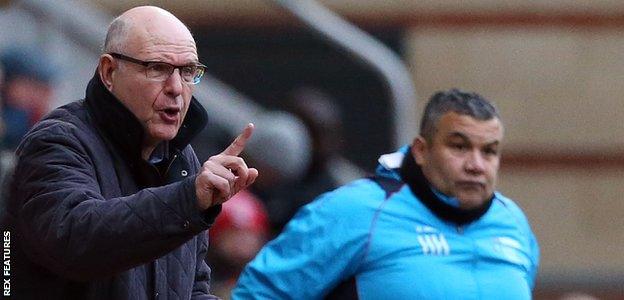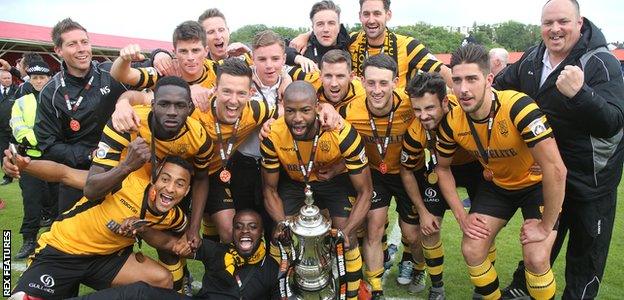Maidstone United: The demise and rise of an expelled Football League club
- Published
BBC Archive: Maidstone United expelled from Football League
Homeless, two players on the books and no league to play in.
This is the story of Maidstone United, the last club before Bury to be expelled from the English Football League. For the past 27 years they have been trying to return to the pinnacle of their football existence.
But this is not a club that sees itself as a football tragedy - not with more than 20 trophies and eight promotions won since 1992 and an England international among its alumni.
"It is a tragic episode in our story. That is what it is, because the story is still going," said John Still, Maidstone's head of football who returned to the club last season after 30 years away.
Still says there was no "romanticism" in the reunion, despite them being back in the fifth tier last term, the level he left the club at in 1989 having been the boss that took them to the old Fourth Division.
He simply felt his former club had run out of "momentum" - the sort that gets a team from Kent County League Fourth Division to the top tier of the non-league system. The 69-year-old, however, was not able to guide them to safety last season as they were relegated to the sixth tier.
"For me to try to play even a small part in one day getting the club back would be fantastic," Still told BBC Sport. "Our dream, 100%, is to again be a Football League club."
Where was the inquest?

John Still turned down an offer from Maidstone to manage them in the Football League after promotion, opting to remain a part-time manager so he could work outside the game
Maidstone were a Football League side for just three seasons and never played a game in their home town.
The day after the first-ever round of Premier League fixtures - a weekend that ushered a lucrative new era for the English game - the Stones resigned their place in the league.
Debts of £650,000 for a club that was ground-sharing in Dartford - having sold their home in Maidstone in the late 1980s and then failed with 47 planning applications to build their own ground - saw them unable to start life in the Third Division in 1992.
The then 95-year-old club was not even the first to go out of business that year, as Aldershot went bust a season earlier.
Like scenes in Bury almost three decades later, there was a sense of disbelief that a club could go under when a football gold rush was being enjoyed by others nearby.
"When I first came to Maidstone it was a vibrant football club, so it was difficult to understand how a club of that size, a big non-league side at the time, with all its desire and drive found itself unable to fulfil its financial commitments," said Still.
"I can't believe in this day and age a club can again allow that to happen."
On Thursday the future of Bury will be discussed at an English Football League meeting, with efforts being made to reinstate the club to League Two next season.
The original Maidstone United, however, ceased to exist and instead a new club - linked to youth outfit Maidstone Invicta - was reformed in football's "wilderness" 10 tiers down in the league pyramid.
Bill Williams, 77, was there as manager when the old club was condemned, helped in its resurrection and now serves as chief executive.
"It was a dreadful time for the club, the supporters and the town as a whole," Williams told BBC Sport.
For Bury, that "dreadful" pain prompted local MPs to petition for the Shakers to be allowed back into the EFL, while the league has commissioned an independent review of the entire saga and the Digital, Culture, Media and Sport Committee is holding a hearing about how clubs are safeguarded.
Asked if the reaction was the same when Maidstone were the second club to suffer a similar fate in the space of six months in 1992, Williams said: "No. There was nothing like how people are coming from all directions to solve Bury's problems.
"But they should be looking for a solution for clubs in dire straits - something, somewhere along the line that helps and should not be taken advantage of.
"First of all, it is for all clubs to manage themselves correctly, but then the league needs to make sure they manage the clubs correctly.
"It was amazingly bad management when we went out of business, and we shouldn't have - I never had a good feeling about our budgets as we were losing £500,000 a year.
"We have learned how to manage a football club here because we were obviously hurt badly."
New beginnings and finding Chris Smalling
It took Maidstone 24 years to return to the town after the disastrous ground sale, moving into their Gallagher Stadium home in 2012.
Before that, they survived and even thrived as football nomads - at first winning games on village greens before soon going on to collect titles on parks in nearby towns.
While they were not the best of times, they were among some of the happiest.
Along the way, they even helped bring through Manchester United defender Chris Smalling. In doing so, the club replicated feats of old Maidstone with European Cup-winning former England international David Sadler going from Maidstone to the Red Devils four decades earlier.
"Playing on village greens was awful, but we have had some wonderful times," said Williams.
"We are fortunate that the football club always had a good following in the town. That really played a huge part in bringing us back up the leagues because even when we went out of business we were still getting 300 or 400 people watching us 10 leagues down."
'Fans kept our heart beating'

Maidstone United were promoted back to the top flight of non-league football in 2016, where they remained for three seasons
Williams talks of needing to have "a plan and the land" in trying to build the club.
He also readily acknowledges that their greatest triumphs - building a stadium and beating Stevenage in the first round of the FA Cup in 2014 while still a seventh-tier side - were made possible by owners Oliver Ash and Terry Casey, who got involved when the club were again in financial trouble in 2010.
"You need luck and we have had ours with Oliver Ash and Terry Casey," said Williams.
Having those with "money to throw in" is vital, Still agrees, but for as much as he sees the demise and rise of the club as a tale of football economics, he feels they are a side who only survived thanks to the passion, commitment and vision of those who supported them.
"A football club with supporters is a living thing - the people who have vowed to take this on have to be the heartbeat of the club," added Still.